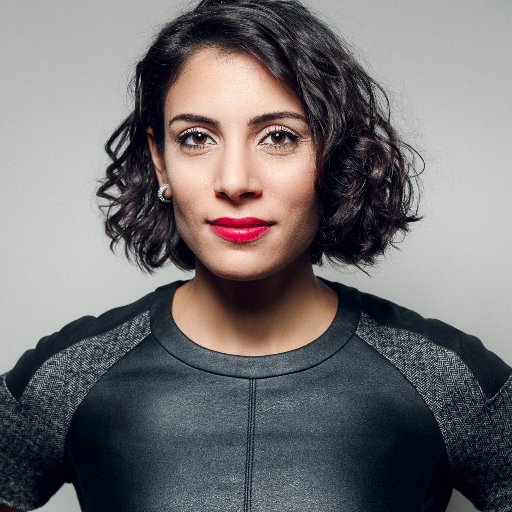WoW Woman in Tech | Hala Hanna, Director of Economic Prosperity at MIT Solve
Interview by Marija Butkovic @MarijaButkovic
Hala Hanna is the Director of Economic Prosperity at Solve – an initiative of the Massachusetts Institute of Technology. Her work is focused on solving through innovation and partnership challenges related to economic equality, prosperity, and the future of work in an era of profound digital transformation. Hala’s career revolves around policy, innovation, and partnerships for social impact. This includes heading a public-private initiative for employment in the Middle East at the World Economic Forum, working with governments on public sector reform and donor engagement through her work at the World Bank and the UN, and advising not-for-profits on strategy and business models. Her last appointment at the World Economic Forum was as Director of Strategy and Chief of Staff. In 2015 she co-founded a policy platform that counts 90,000 subscribers. Hala holds Masters in Public Policy from Harvard University, and in Int’l Development and Economics from American University, DC. Her Bachelors in Economics is from the American University of Beirut. She was a Global Leadership Fellow of the World Economic Forum. Hala is a Senior Advisor of the Women Political Leaders Global Forum and is a board member of Harvard Kennedy School’s Women Alumni Group.
What does your current job role within MIT entail?
I lead our economic prosperity work at Solve – finding the most innovative solutions that would address the future of work and create a more equal, inclusive society in the age of deep digital transformations
What projects are you working on at the moment?
We’re continuing to build a community that shares interest in solving the world’s most pressing global challenges, and a marketplace for social impact innovation. On the day to day, my team is focused on our 8 Solvers selected through the Women & Technology challenge to support them with the resources they need to increase their scale.
How has your career progressed since your degree? Has it been an easy industry to get into or have you had many challenges?
It has been an impatient quest for social impact, and many lucky breaks along the way. I owe where I’m today as much to hard work as to people believing in me and giving me a chance. 15-year-old me could’ve never imagined that I’d travel the world with the World Bank, make the smartest kindest friends studying at Harvard, work with presidents and luminaries at the World Economic Forum, and help build an MIT initiative that carries all the values that I believe in.
Because of my multidisciplinary background, and of moving around quite a bit, I don’t belong into one industry or one job family. My career started very economics and data analysis oriented (measuring governance in public sector services in Africa & Middle East), switched to policy work in Liberia, politics and program development in MENA, and strategy & management as chief of staff at the WEF.
There have been naysayers along the way for whom I was too young or too female (#metoo), but overall I am grateful at how lucky I’ve been and excited for what’s ahead.
What are your biggest achievements to date?
That may best be left for others to judge. And I hope my bigger achievements are ahead of me!
What does the #WomenInTech movement mean to you? What are the challenges of being a woman in STEM?
The future is written in code and women need to be part of it. As digital advancements are reshaping our businesses, economies, and society, they can either worsen gender gaps, or help fix them. Think about it: most job growth will come from STEM fields, yet women make up only 12% of engineering students in the US. Much of our day-to-day is dictated by digital gadgets, yet only 6% of apps are designed by women. Why does it matter? Engineers are involved in designing the world around us. People experience the world differently – do we want to miss out on 51% of a perspective? One of our Solvers, Amrita, redesigned sanitary pads to a 100% natural biodegradable banana fiber pad that’s 7 cents a piece. For a girl in India, that’s the difference between missing out on school or not.
Who are your 3 inspirational women in STEM?
Ursula Burns – the first African American to head a Fortune 500 and one of the most no-B.S. people out there. She hits the nail on its head every time she tackles the topic, and does so with such humour and leadership. Ursula is the co-chair of our Women & Tech challenge.
Cynthia Barnhart – MIT’s Chancellor and woman in STEM. MIT already does a ton of efforts on gender, with 50% of graduate engineering classes being women, and Cynthia is pushing the institution even further, putting a renewed focus recently on preventing sexual misconduct on campus.
Roya Mahboob – one of our Solvers, is Afghanistan’s first female tech CEO, and continues to break taboos and open doors for others to follow. Last time I checked she’s building a STEM school in Herat.
Website: www.solve.mit.edu
Facebook: @SolveMIT
Instagram: @solveMIT
LinkedIn: Solve MIT
This interview was conducted by Marija Butkovic, Digital Marketing and PR strategist, founder and CEO of Women of Wearables and co-founder of Kisha Smart Umbrella. She regularly writes and speaks on topics of wearable tech, fashion tech, IoT, entrepreneurship and diversity. Visit marijabutkovic.co.uk or follow Marija on Twitter @MarijaButkovic @Women_Wearables @GetKisha.


